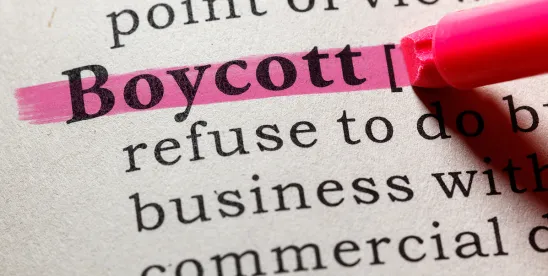During the mid-1970’s, the U.S. adopted two laws that seek to counteract the participation of U.S. citizens in other nations’ economic boycotts or embargoes. These antiboycott laws are the 1977 amendments to the Export Administration Act (EAA) and the Ribicoff Amendment to the 1976 Tax Reform Act (TRA). They were adopted to encourage, and in specified cases require, U.S. firms to refuse to participate in foreign boycotts that the United States does not sanction.
Although the U.S. antiboycott regulations apply to any unsanctioned boycott, as a practical matter the most prevalent unsanctioned boycott is the Arab League’s boycott of Israel. These regulations cover not only agreements by U.S. companies to participate in the boycott, such as by not doing business with firms that are on the “blacklists” maintained by the Arab League, but also forbid even providing information regarding the business activities of the U.S. entity that would help identify whether the firm is participating in the boycott.
Application of Antiboycott Laws
The antiboycott regulations under the EAA, which are administered by the U.S. Department of Commerce’s Office of Antiboycott Compliance (OAC), prohibit U.S. persons from complying with boycott requests and impose reporting requirements regarding the receipt of such requests. The TRA, which is administered by the U.S. Department of Treasury, denies certain tax benefits to U.S. entities that participate in or cooperate with an international boycott.
Both the antiboycott regulations under the EAA and TRA prohibit and penalize similar activities. The main types of conduct that may be prohibited include:
- Agreements to refuse or to actually refuse to do business with or in Israel, or with any other blacklisted company.
- Agreements to discriminate or to actually discriminate against anybody based on race, religion, sex, national origin, or nationality
- Agreements to furnish or to actually furnish information about the race, religion, sex, or national origin of another person
- Agreements to furnish or to actually furnish information about business relationships with or in Israel, or with a blacklisted company
- Payments or other methods implementing a letter of credit that contains prohibited boycott terms or conditions
The Arab League countries include Algeria, Egypt, Iraq, Jordan, Kuwait, Lebanon, Libya, Qatar, Saudia Arabia, Somalia, Syria, the United Arab Emirates, and Yemen. Egypt, Jordan, and the UAE do not participate in the boycott, while certain non-Arab countries, such as Pakistan, may also boycott Israeli goods and services. The level of adherence to the Arab League boycott, however, varies among companies that conduct business within the Arab League.
Differences in Commerce Department and IRS Antiboycott Laws
The key difference in how the EAA and the TRA antiboycott regulations are applied is intent:
- A covered person violates the EAA antiboycott regulations by engaging in prohibited activities, but only if it acts with the intent to comply with, further, or support any unsanctioned boycott.
- The IRS antiboycott laws do not impose a requirement of intent. Thus, a U.S. taxpayer can be denied tax benefits whether or not the covered person intended to participate or cooperate with the unsanctioned boycott.
Reporting Requirements
A key part of the antiboycott regulations are the reporting requirements.
The EAA antiboycott regulations require U.S. persons to report quarterly any requests they may have received to comply with, further, or support an unsanctioned boycott request (even if such requests were promptly rejected). Specifically, the U.S. person or company must file form BIS-621P for single transactions and form BIS-6051P for multiple transactions received in the same calendar quarter.
The IRS requires U.S. taxpayers with operations in or relating to a boycotting country to file annually Form 5713, International Boycott Report, which is available on the IRS website. This form must be filed even if the operations involved no boycott-related activity or request.
The OAC also strongly encourages companies to self-disclose voluntarily potential antiboycott violations. Voluntary self-disclosures are a mitigating factor with respect to administrative enforcement actions that may be pursued by the OAC, though they do not prevent transactions from being referred to the Department of Justice for criminal prosecution.
Penalties
The EAA antiboycott regulations impose significant criminal and civil penalties against violators, including fines and imprisonment, as well as the loss of export privileges. Criminal penalties that may be imposed for knowing or willful violations include:
- Fine of up to $1 million
- Imprisonment of up to 20 years
The maximum civil penalty that may be imposed for each violation is the greater of $364,992 or twice the value of the underlying transaction.
Under the TRA antiboycott regulations, a U.S. taxpayer or its affiliates that participate in or cooperate with an unsanctioned boycott can be subject to the following:
- Denial of foreign tax credits
- Deferral of taxation of earnings of a controlled foreign corporation
- Fine of up to $25,000 or one year of imprisonment, or both, for a person’s (including a company’s officers or employees) willful failure to file the required IRS antiboycott reports






 />i
/>i

